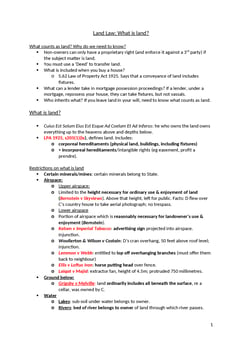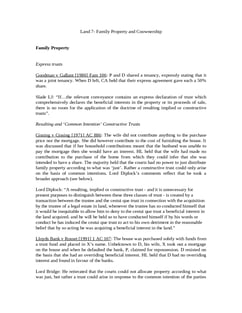Gillett v Holt [2001] Conv 13 and 78
Judgement for the case Gillett v Holt
Table Of Contents
Plaintiff promised Defendant that he would leave property to him in his will and even announced it at family gatherings, however Defendant did not leave it to Plaintiff.
Plaintiff claimed the property under proprietary estoppel, and the court allowed his claim, the belief being sufficiently certain.
Robert Walker LJ
"Unconscionability” was the key to proprietary estoppel, and the requirement of detriment was only considered as part of a broad investigation into unconscionability.
It was not necessary to show an irrevocable promise, since the doctrine of proprietary estoppel made it irrevocable (Circular argument: it claims the doctrine makes statements definite, when actually the doctrine does not bite in the first place unless the understanding is definite itself - Gardner).
He accepts the broad view that the court should “look at the circumstances in each case to decide in what way the equity can be satisfied”.
For Further Study on Gillett v Holt

A collection of the best GDL notes the director of Oxbridge Notes (an O...
Need instant answers? Our AI exam tutor is here to help.
Ask questions 🙋 Get answers 📔 It's simple 👁️👄👁️
Our AI is educated by the highest scoring students across all subjects and schools. Join hundreds of your peers today.
Get StartedRelated Product Samples
These product samples contain the same concepts we cover in this case.
| Land Law | Estoppel Notes (10 pages) |
| GDL Land Law | Proprietary Estoppel Notes (7 pages) |
| GDL Land Law | Proprietary Estoppel Notes (4 pages) |

 Since 2010, Oxbridge Notes has been a trusted education marketplace, supplying high-quality materials from top achievers at universities like Oxford, Cambridge, LSE, Harvard, and Yale.
Since 2010, Oxbridge Notes has been a trusted education marketplace, supplying high-quality materials from top achievers at universities like Oxford, Cambridge, LSE, Harvard, and Yale.